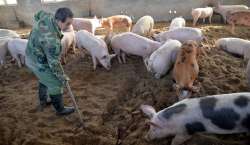New swine flu-like virus with 'human pandemic potential' found in China, scientists worried
A new strain of influenza virus similar to swine-flu but with huge 'human pandemic potential' has been found in China. The discovery has left scientists and health officials concerned. The new strain of influenza was recently discovered in pigs that has the potential to infect humans. According to researchers, a number of workers from Chinese abattoirs and the swine industry exhibited signs of infection.

A new strain of swine-flu like influenza virus with huge human pandemic potential has been found in China. The discovery has left scientists and health officials concerned. The new strain of influenza was recently discovered in pigs that has the potential to infect humans. According to researchers, a number of workers from Chinese abattoirs and the swine industry exhibited signs of infection. The discovery of the new virus comes amid the coronavirus pandemic.
The virus, which the researchers call G4 EA H1N1, can grow and multiply in the cells that line the human airways. They found evidence of recent infection starting in people who worked in abattoirs and the swine industry in China.
Current flu vaccines do not appear to protect against it, although they could be adapted to do so if needed.
The new virus is genetically descended from the H1N1 strain, which had caused a pandemic in 2009. Various test results have shown 10.4 per cent of swine workers and up to 4.4 per cent of general population may have already been exposed to the new virus.
The G4 EA H1N1 possesses “all the essential hallmarks of being highly adapted to infect humans”, scientists said at Chinese universities and China’s Centre for Disease Control and Prevention.
"Right now we are distracted with coronavirus and rightly so. But we must not lose sight of potentially dangerous new viruses," Prof Kin-Chow Chang, who works at Nottingham University in the UK, told the BBC.
G4 was observed to be highly infectious, replicating in human cells and causing more serious symptoms in ferrets than other viruses.
Tests also showed that any immunity humans gain from exposure to seasonal flu does not provide protection from G4.
WHO warns 'the worst is yet to come'
Meanwhile, the head of the World Health Organization has warned that the coronavirus pandemic is not even close to being over. It has now been six months since the first cases of a mysterious pneumonia-like illness were reported in Wuhan, China.
At the time it was feared that we would see a repeat of the Sars outbreak of 2002 to 2004, which killed 774 people.
Now, with more than 500,000 people dead and more than 10 million confirmed cases worldwide, WHO director-general Tedros Adhanom Ghebreyesus has said this is "a moment for all of us to reflect", the BBC reported.
But, he warned, the "worst is yet to come" - adding that "with this kind of environment and conditions, we fear the worst".
Despite progress in some countries, he said the pandemic was speeding up and the world would need even greater stores of resilience, patience and generosity in the months ahead.
"Six months ago, none of us could have imagined how our world - and our lives - would be thrown into turmoil by this new virus," Tedros said at the WHO press conference.
Also Read | Kung flu: Donald Trump again blames China for COVID-19 pandemic